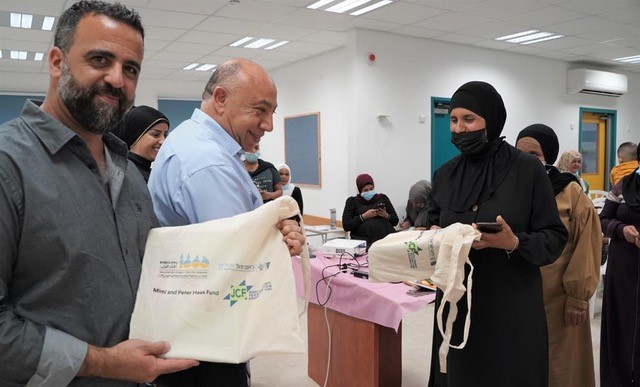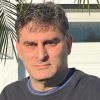Creating a Shared Society in Israel Requires Building Fences, Not Walls
It was one of the most brutal escalations of violence that Barak Loozon, the Federation’s Israel Office Director, had witnessed.
As mobs roamed the streets in mixed cities such as Haifa, Jaffa, Akko, and Lod this past May, Jews and Arabs were afraid to leave their homes. “People didn’t want to even go outside because their next-door neighbors were directing the mobs outside their windows, shouting things like: ‘He’s Jewish! Burn his car!’”
What happened next transformed a frightening situation into a surreal nightmare. “In the midst of all this violence, rockets were being fired from Gaza into the same neighborhoods. So when the missiles came in, those same Jews and Arabs took cover in the exact same shelters.”
That was the setting in which Loozon, the Federation, and our partners renewed their commitment to continue their efforts to foster a society in which Jews and Arabs can coexist peacefully.
“To be honest, even talking about the common good and social cohesion at that time was problematic and extremely challenging,” Loozon said.
But they did. In fact, they did a whole lot more than talking.

Rebuilding Trust Through Reflection and Conversation
“After the flames went down a little bit, we invited our partner organizations to come together, initially just to get a chance to breathe,” said Loozon. After all, this was a nation not only ravaged by war but by COVID-19. Furthermore, they were coming out of one of the most heated elections that the country had ever seen. Still, in June, their partners in peace came: Jews and Arabs, NGOs, community leaders, and virtually anyone interested in a shared society. And the event was extraordinary.
“It was actually a platform for them to rebuild trust. Trust was really one thing that got lost. Not only trust of each other, but also trust in the police and trust in the state and in the government. About 150 people came and it was really, really something to see.” ~ Barak Loozon
One of the highlights from the event included an intense performance based on the American “I’m not racist” video (Content warning: Both videos contain explicit and racist language). Afterward, the two artists and friends, one Jewish, the other Arab, came on stage and reflected on the process they went through in order to create this powerful video. And the conversations that followed pulled no punches: these are communities with substantial differences and even some hostilities. But neither the artists nor anyone in attendance would permit those differences to impede their shared mission of peaceful coexistence and friendship... And that’s where real hope came in. As Loozon put it, it was not a naïve, watered-down version of hope. But rather, a hope that is predicated on an understanding that “Living together in Israel requires work. It requires both recognizing the others’ pain while being committed to a shared future. And it requires acknowledgment of other cultures and identities as an asset and form of knowledge.”
Strong Partnerships Provide Ongoing Hope
Despite a media narrative that sometimes paints a bleak picture, one only need to take a look at the work of some of our Federation partners to see why our hope is grounded and strong:
- Co-Impact is empowering the largest companies in Israel to become diverse and inclusive workplaces by advancing Arab employment as a priority within Israel’s biggest companies. To date, 37 participating companies have made over 4,500 quality placements.
- AJEEC is an Arab-Jewish Center for Empowerment, Equality, and Cooperation in the Negev, run by a joint team of Jews and Arabs promoting peace and economic development through education and volunteerism, particularly in the Bedouin community.
- The Living Together Center is an innovative initiative working to create a new social partnership among all communities and sectors in Israeli society, driven by an appreciation of the inherent richness of that diversity. The Living Together Center helps advance the common good across the fields of academia, education, culture, and public awareness.
Yet another inspiring source of hope is an Israeli nonprofit called Yahel (Hebrew for illuminate), which offers a nine-month “Social Change Fellowship” in which participants from all ethnic and religious backgrounds learn and work hand-in-hand with schools, community centers, and non-profit organizations focused on meeting their local community's needs.
Bay Area native, Alina Herzberg, has just completed her Yahel fellowship, much of it spent in the mixed city of Lod where she worked with many members of the Arab community. Much like Loozon, she does not look at the current climate in Israel with blinders on. “To be honest,” she said, “since the violence started, people have retreated into their communities and don't feel as trustful about their neighbors as they did a few months ago. And I think that it’s going to take a really long time before a shared society is anywhere close to what it needs to be.”
Yet despite her frank assessment of the real challenges these communities within a community face, Alina shares Loozon’s long-term optimism for the city and the people she grew to love. “What gives me hope is the fact that the community leaders with whom we've been working all year haven't left and they haven't given up. These people are tired and traumatized and scared, but they are so resilient… And despite everything that's happened, they’re still committed to living in this city and living their lives so they can make ends meet and take care of themselves and their families.”
Rising Up to Unite Together
Harold Kushner, prominent American Rabbi, and author famously wrote of how there is no good answer for why tragedy strikes and why good people suffer. But our redemption, he observed, can be found in how we respond and what we do about it.
People and organizations like Co-Impact, AJEEC, Living Together, and Yahel are doing the type of grassroots work that gives space for autonomy while recognizing that integration makes our communities stronger.
“There’s a difference between building a wall and building a fence,” said Loozon, after yet another marathon day. “With a wall, there’s no commitment, no shared space, no… nothing. That’s it. But the beauty of a fence is that it can provide security to your family while allowing you to see beyond, and to come and go, and to reach out to others.”
And that’s how you create a truly shared society.
Learn more about the Federation’s efforts to foster a shared society in Israel.


